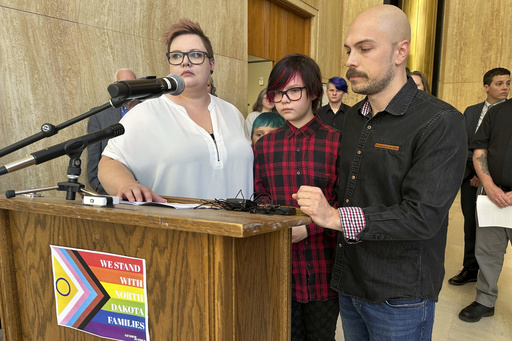BISMARCK, N.D. (AP) — A North Dakota law banning gender-affirming care for children will continue to be enforced pending a court challenge, but any kids whose treatments began before the law took effect in April 2023 can keep getting the care, according to a judge’s ruling released Wednesday.
Judge Jackson Lofgren denied a preliminary injunction sought by families seeking to overturn the law, as he had previously done in November when the plaintiffs sought a temporary restraining order.
The plaintiffs said a grandfather clause in the law is so vague it led providers to stop treatments in the state, but the judge made clear those minors can continue any medical care they had before the law took effect.
It isn’t clear that the plaintiffs are “substantially” likely to win their case, now scheduled for a November trial, on claims that the law violates rights to parent or to personal autonomy and self-determination, the judge said.
He also sided against claims that the grandfather clause is unconstitutionally vague, and that the plaintiffs have shown irreparable harm. With the current law in effect for more than a year now, Lofgren said “the public interest in maintaining the status quo weighs against granting a preliminary injunction.”
The law took immediate effect when Republican Gov. Doug Burgum signed it in April 2023 after overwhelming approval by the GOP-controlled legislature. It makes it a misdemeanor for a health care provider to prescribe or give hormone treatments or puberty blockers to a transgender child, and a felony to perform gender-affirming surgery on a minor.
“The longer this law is allowed to remain in effect, the more North Dakota kids and families will be harmed by the state’s unfair, unjust, and unconstitutional denial of the essential and life-saving health care they need,” Gender Justice Senior Staff Attorney Brittany Stewart, who represents the families and a doctor challenging the ban.
Republican state Rep. Bill Tveit, who brought the bill, was pleased with the ruling. He said the law protects children from irreversible procedures.
Opponents said the ban will harm transgender kids who face greater risks of depression, self-harm and suicide, and stressed that no one performs such surgeries in the state.
Despite the exception for children who were receiving treatments before the ban took effect, providers have considered the grandfather clause too vague to risk it, so the plaintiff families have had to travel out of state to get gender-affirming care for their children, Gender Justice said.
The judge disagreed, writing that such children “can receive any gender-affirming care they could have received in North Dakota prior to the Health Care Law’s enactment.”
Gender Justice agreed that the clarification “paves the way for providers to resume care for these patients in North Dakota.”
“However, significant barriers to access will remain for most or all children and families seeking care in North Dakota, as doctors who stopped providing care to transgender youth may hesitate to resume care due to concerns over the serious legal threats posed by the law,” the organization’s statement said.
Twenty-five states have adopted bans on gender-affirming care for minors in the past few years, nearly all of them challenged in court. Arkansas is appealing after a court struck down its ban entirely. Courts blocked enforcement of the law in Montana. And the ACLU has asked the U.S. Supreme Court to review whether the bans should remain in effect in Kentucky and Tennessee. The high court has allowed the Idaho law to remain in effect while lawsuits proceed.
___
AP writer Geoff Mulvihill contributed to this report from Cherry Hill, New Jersey.
For more AP coverage of LGBTQ+ issues: https://apnews.com/hub/lgbtq-legislation


